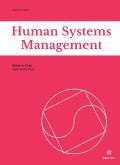Authors: Abu Orabi, Tareq | Al-Hyari, Hadeel Sa’ad Muhammed | Almomani, Hanan Mohammad | Ababne, Ahmad | Abu Huson, Yazan | Ahmed, Emad | Albanna, Hussein
Article Type:
Research Article
Abstract:
BACKGROUND: The bibliometric analysis and systematic appraisal of research on job satisfaction and organizational commitment in administrative and technical studies in the study show substantial efficacy, opening the path for future research in this subject. OBJECTIVE: The goal of this literature review is to identify important ideas that have the potential to influence job satisfaction and organizational commitment, as well as to provide the groundwork for future research in this field using bibliometric analysis. METHODS: This study used a bibliometric review approach to examine Web of Science papers on job satisfaction and organizational commitment.
…RESULTS: Performance, Impact, Transformational Leadership, Citizenship Behavior, Employee Performance, Organizational Justice, Job Satisfaction, Turnover, Psychological Empowerment, Organizational Commitment, Normative Commitment, Empowerment, and Turnover Intentions were the most frequently used terms in research on job satisfaction and organizational commitment, according to the survey. The bulk of these publications were published in the United States, China, Turkey, South Korea, Canada, Indonesia, Pakistan, Taiwan, and Jordan. IMPLICATIONS: The findings of the research may be used to generate articles on work satisfaction and organizational commitment in the field of market discipline, notably in the domains of business and technology.
Show more
Keywords: Job satisfaction, organizational commitment, businesses, Vosviewer, bibliometric analysis
DOI: 10.3233/HSM-230130
Citation: Human Systems Management,
vol. 43, no. 3, pp. 407-430, 2024
Price: EUR 27.50





